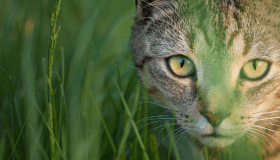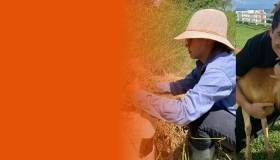
November 30, 2017 – Dr. Molly McCue, researcher and associate professor at the College of Veterinary Medicine, University of Minnesota credits Morris Animal Foundation funding for propelling her distinguished career in equine genetics.
“There were many important things early in my career that were funded by the Foundation. My very first grant that I received was a postdoc award that supported my salary,” said Dr. McCue. This allowed Dr. McCue early in her career to focus on research alongside established researchers and mentors that were laying the groundwork for modern equine genetic research.
Supporting and funding new researchers is critical to finding the next generation of treatments, diagnostics and cures, and Morris Animal Foundation, through its grants program, invests in people and research to make sure we can advance animal health. It’s our donors, of course, who make it all possible.
New Era of Equine Genetic Research
In 2007, coinciding with Dr. McCue’s fellowship training grant, a group of international scientists came together to form the Equine Consortium for Genetic Research. The consortium, led by University of Minnesota equine professors Drs. Jim Mickelson and Stephanie Valberg, included 32 scientists from 18 elite academic institutions throughout nine participating countries. Morris Animal Foundation awarded the team nearly half a million dollars to help launch the modern era of equine genome analysis and develop new tools valuable in genome-wide searches for mutations.
One key output from the consortium was an important genetic research tool called the SNP genotyping array for the horse. This early tool, and successive versions, has had a major impact on the field of equine medicine, helping researchers locate genes associated with specific equine diseases. Early discoveries included the location of genes contributing to lavender foal syndrome (an inherited, neurological disease in Arabian horse foals), recurrent exertional rhabdomyolysis (also called tying up) in Thoroughbreds, dwarfism in miniature horses, and severe lordosis (curvature of the spine) in American saddlebreds, to name a few. The tools and information generated by this team provided the foundation for almost all equine genetic studies to date.
Training of a New Pool of Equine Researchers
In addition to the critical genetic tools developed by the consortium, the funding helped train a new pool of talented undergraduate, graduate, veterinary and postdoctoral students in equine genetics. Like Dr. McCue, many of these students went on to follow research career paths and are now established investigators themselves.
Dr. McCue’s current studies are a direct result of the information generated by the consortium grant. She is currently looking for genetic risk factors for equine metabolic syndrome, a complex disorder in horses characterized by insulin resistance, obesity and susceptibility to laminitis.
“One thing that makes Morris Animal Foundation unique among equine funding agencies is that this organization is willing to invest in much-needed bench research to solve complex diseases, like equine metabolic syndrome, a condition that affects multiple breeds,” said Dr. McCue. “But another important impact of their funding, not only for me personally, is the people I have trained. It is this chain of people who will go on to contribute many great things to equine health for many years to come.”
The Foundation continues to help Dr. McCue ensure that the future for equine researchers remains bright.
“Morris Animal Foundation is one of the go-to-places that help me fund the people in my lab, which is one of the most important pieces of the research equation, and also one of the hardest to fund,” said Dr. McCue.
Foundation funding also helped Dr. McCue secure prestigious grants from United States Department of Agriculture and National Institutes of Health.
“In the last decade, I have secured almost $8 million in funding for equine health research; leveraged from the Foundation’s initial investment in my education and training,” said Dr. McCue.
Support Equine Research and Train a New Researcher
Almost every Morris Animal Foundation grant helps train a new researcher, and that researcher can train countless more. This constant filling of the pipeline with the brightest minds in health research ensures there will be solutions for animal diseases today and for years to come. Thanks to Foundation funding, Dr. McCue spent the majority of her time, early in her career, doing the research she loved with the horses she loves.
Learn more about our equine genetic research findings:
Genome-wide analysis reveals selection for important traits in domestic horse breeds, Genetics 2013
Genetic diversity in the modern horse illustrated from genome-wide SNP data, PLoS, 2013
Identification and validation of risk loci for osteochondrosis in standardbreds, BMC Genomics, 2016




